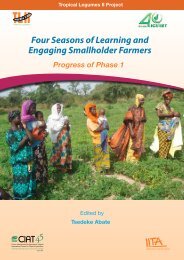A case for pro-poor agenda with special reference to India - Icrisat
A case for pro-poor agenda with special reference to India - Icrisat
A case for pro-poor agenda with special reference to India - Icrisat
Create successful ePaper yourself
Turn your PDF publications into a flip-book with our unique Google optimized e-Paper software.
power, solar energy and plants. One such source<br />
that is currently gaining in importance is the<br />
<strong>pro</strong>duction of energy from plant biomass or more<br />
specifically ethanol from sugar or starch derived<br />
from grains/biomass and biodiesel derived from<br />
the <strong>pro</strong>cessing of edible and non-edible vegetable<br />
oils. Biofuels are renewable energy sources that<br />
contribute <strong>to</strong> the reduction in greenhouse gases.<br />
Additionally, biofuels would have a positive effect<br />
on demand <strong>for</strong> agricultural raw materials, arresting<br />
the long-term decline in agricultural prices,<br />
thereby, benefiting the agricultural <strong>pro</strong>ducers.<br />
However, there are strong apprehensions that<br />
as more and more land is brought under biofuel<br />
crops, food prices would increase substantially<br />
affecting <strong>poor</strong> consumers particularly those from<br />
low-income net food importing countries.<br />
This policy brief discusses the current and future<br />
demand <strong>for</strong> biofuels, and the apprehensions<br />
about food–fuel trade offs, and ultimately goes<br />
on <strong>to</strong> highlight alternative feed s<strong>to</strong>cks that do not<br />
com<strong>pro</strong>mise on food security and hence are more<br />
<strong>pro</strong>-<strong>poor</strong>.<br />
Biofuels <strong>pro</strong>duction<br />
Based on the available data from several sources,<br />
it is estimated that ethanol <strong>pro</strong>duction, which was<br />
12.9 million <strong>to</strong>ns in 1991, leapfrogged <strong>to</strong> 40.3<br />
million <strong>to</strong>ns by 2006 (Aeck 2005). Brazil and the<br />
USA are the dominant <strong>pro</strong>ducers accounting <strong>for</strong><br />
nearly 70% of global <strong>pro</strong>duction. Several other<br />
countries such as China, <strong>India</strong>, France, Russia,<br />
South Africa and UK make up the rest.<br />
Biodiesel <strong>pro</strong>duction that accounts <strong>for</strong> a smaller<br />
<strong>pro</strong>portion of liquid biofuels increased from 0.01<br />
million <strong>to</strong>ns in 1991 <strong>to</strong> 4.0 million <strong>to</strong>ns by 2006<br />
(Figure 2). Germany and France are the major<br />
<strong>pro</strong>ducers of biodiesel <strong>with</strong> USA, Australia and<br />
Brazil emerging as new players.<br />
The growth in both ethanol and biodiesel<br />
<strong>pro</strong>duction has accelerated since early 2000<br />
(Figure 2) and this trend is expected <strong>to</strong> continue<br />
since many governments have now made it<br />
manda<strong>to</strong>ry <strong>to</strong> blend petroleum <strong>pro</strong>ducts <strong>with</strong> 5 <strong>to</strong><br />
10% biofuels.<br />
The main raw material sources <strong>for</strong> bioethanol<br />
<strong>pro</strong>duction is sugarcane in Brazil as also in other<br />
Latin American countries, corn in the United<br />
States, corn and wheat in China, sugarcane<br />
molasses in <strong>India</strong>, cassava and sugarcane in<br />
Thailand and sugar beet and grains in Europe.<br />
Brazil is a successful example of sugarcane based<br />
ethanol <strong>pro</strong>duction from sugarcane juice. Over<br />
half of its cane <strong>pro</strong>duction of nearly 300 million<br />
<strong>to</strong>ns is turned in<strong>to</strong> ethanol. Over half of the cars in<br />
Figure 2.World ethanol and biodiesel <strong>pro</strong>duction.<br />
Source: 1991-2003 International Energy Agency, 2005. 2004-06 FO Licht, 2007.<br />
2

















